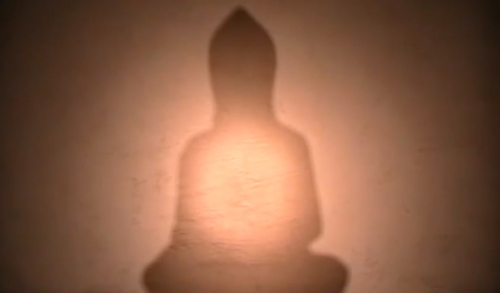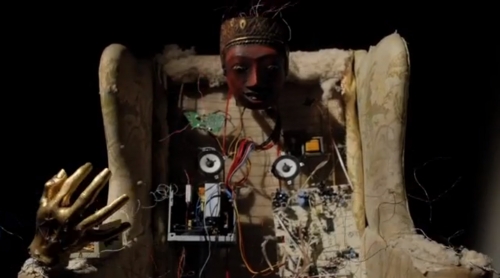If you haven’t already, go ahead and vote on all the films on our Short Films Showcase—we have until Friday to decide which filmmaker rolls home with $1,000. We know that 25 films, even at 5 minutes a pop, is a lot, so we’re featuring a few on the blog each day to help you make some key choices.
 “Day 3287“: In the filmmakers’ words, “Day 3287” is a “visual presentation of the moment of Bodhidharma’s enlightenment after 9 years of zazen.” This visual presentation is a pretty literal “seeing of the light”: the shadow of a meditator slowly becomes a pulsating bulb, and then fades away. As a rendition of Bodhidharma’s enlightenment, I was hoping for more cutting off of eyelids to be involved (not being able to close your eyes=what it really means to be “Awake in the World”), but “Day 3287” was instead a calming short. Nothing wrong with that.
“Day 3287“: In the filmmakers’ words, “Day 3287” is a “visual presentation of the moment of Bodhidharma’s enlightenment after 9 years of zazen.” This visual presentation is a pretty literal “seeing of the light”: the shadow of a meditator slowly becomes a pulsating bulb, and then fades away. As a rendition of Bodhidharma’s enlightenment, I was hoping for more cutting off of eyelids to be involved (not being able to close your eyes=what it really means to be “Awake in the World”), but “Day 3287” was instead a calming short. Nothing wrong with that.
 “Realization of the Great Void“ gets an A+ for creativity. The film is a stop-motion animation interpretation of a famous Zen discourse by Ch’ing-yuan Wei-hsin. (Although the short does show the discourse, it’s below for convenience.) “Realization of the Great Void” adds an unexpected and spunky flavor to an old Chinese text, introducing the ancient words through what I would call a “Tim Burton goes to Africa” atmosphere. The finished product is a little creepy and a lot of cool.
“Realization of the Great Void“ gets an A+ for creativity. The film is a stop-motion animation interpretation of a famous Zen discourse by Ch’ing-yuan Wei-hsin. (Although the short does show the discourse, it’s below for convenience.) “Realization of the Great Void” adds an unexpected and spunky flavor to an old Chinese text, introducing the ancient words through what I would call a “Tim Burton goes to Africa” atmosphere. The finished product is a little creepy and a lot of cool.
 Our last film for today is “Awaken to Compassion,” an understated film about finding compassion within oneself. The short follows a young woman around airport bathrooms and the like until she finally sits down on a windy beach. As the music rises to a crescendo, the woman smiles joyfully and finds peace within her heart—right as an errant seagull photobombs the moment, strutting around behind her head. I’m not sure if that was supposed to happen, but it was excellent timing. And the filmmaker saves the moment with a solid zoom-in on the seagull at the end.
Our last film for today is “Awaken to Compassion,” an understated film about finding compassion within oneself. The short follows a young woman around airport bathrooms and the like until she finally sits down on a windy beach. As the music rises to a crescendo, the woman smiles joyfully and finds peace within her heart—right as an errant seagull photobombs the moment, strutting around behind her head. I’m not sure if that was supposed to happen, but it was excellent timing. And the filmmaker saves the moment with a solid zoom-in on the seagull at the end.
Discourse of Ch’ing-yuan Wei-hsin:
“Thirty years ago, before I began the study of Zen, I said, ‘Mountains are mountains, waters are waters.’ After I got insight into the truth of Zen through the instructions of a good master, I said, ‘Mountains are not mountains, waters are not waters.’ But now, having attained the abode of final rest, I say, ‘Mountains are really mountains, waters are really waters.’
Are the three understandings the same or different?”
Thank you for subscribing to Tricycle! As a nonprofit, we depend on readers like you to keep Buddhist teachings and practices widely available.